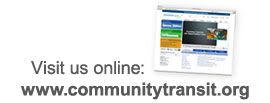Friday, May 7, 2010
What happens when Sunday bus service goes away?
A central component to Community Transit’s June 2010 service change plan is the suspension of all Sunday and major holiday service. This means no local buses, no Swift and no DART paratransit service beginning June 13.
The idea behind this is that, by shutting operations completely on one day, the agency saves more money and impacts fewer riders than by cutting more routes and trips every day of the week. One way to look at it is that the Sunday/holiday suspension cuts 28,000 hours of service for the year; if the base remained open on these days it would take 48,000 hours of cuts to get the same dollar savings.
While Sundays and holidays have lower ridership than other days, there will still be many people impacted by this move. In particular, people who use the bus or DART to get to church or work on Sundays are going to be impacted more than those who might use the bus for discretionary travel.
To help lessen the impact of the loss of Sunday service, Community Transit is working closely with SNOTRAC, the Snohomish County Transportation Coalition, and Volunteers of America (which runs the county’s 2-1-1 social services hotline) to provide resources for those who need transportation on Sundays.
Community Transit is assisting SNOTRAC with an effort to contact churches in the service area to see if the churches are willing to provide transportation assistance to their members, and possibly people who attend nearby churches. This transportation might be through a church van or a coordinated effort by church members. If many churches can take care of the need for their own members, great; if they can also handle some of the need for other churchgoers, that is even better.
Community Transit also is contacting local employers to let them know of the loss of Sunday service and asking if they will help coordinate transportation for their employees.
VOA will use any information that churches or employers provide to add to their list of Sunday transportation resources. The way the 2-1-1 Hotline works is people who need transportation call 2-1-1, say where they are and where they need to go and VOA tells them if there is an existing transportation option that can help them. In some cases there will be; in other cases there won’t be. The unfortunate thing about the loss of Sunday bus service is that there will be people who either cannot get around or will have to scramble to find a ride themselves. A great resource for these people is Rideshareonline, which allows people to find carpools or vanpools in their area.
Community Transit also is in the process of granting 12 vehicles to local nonprofit agencies through the Van GO program. This program awards surplus agency vehicles, including some with wheelchair lifts, to groups that will use them to provide transportation in the community. This year there is an emphasis on groups that could help provide transportation on Sundays.
We received 34 Van GO applications by the April 30 deadline, and the vehicles will be awarded at the June 3 Community Transit Board of Directors meetings. Van GO winners will be included in the 2-1-1 database.
Finally, for those DART-eligible riders who have no other option, Community Transit is using $50,000 to bolster the “Pay Your Pal” program. This is a program in which a customer finds someone (friend, neighbor, family member) to give them a ride, and SNOTRAC reimburses that driver the federal mileage rate. This way the driver is not simply volunteering, and may have an incentive to provide the ride.
DART-eligible riders who contact the 2-1-1 Hotline will be referred to this service if no other option exists for Sunday transportation. Again, because even “Pay You Pal” depends on a driver willing to provide a ride, it is not a guarantee.
Community Transit is seeking new state and federal funding to restore Sunday service. While the current level of service costs about $5 million a year, the agency would need to be sure there is enough funding to restore service indefinitely before bringing it back. We do not want to restore service based on a one-time grant, then have to cancel service again when the grant runs out. Stay tuned.
The idea behind this is that, by shutting operations completely on one day, the agency saves more money and impacts fewer riders than by cutting more routes and trips every day of the week. One way to look at it is that the Sunday/holiday suspension cuts 28,000 hours of service for the year; if the base remained open on these days it would take 48,000 hours of cuts to get the same dollar savings.
While Sundays and holidays have lower ridership than other days, there will still be many people impacted by this move. In particular, people who use the bus or DART to get to church or work on Sundays are going to be impacted more than those who might use the bus for discretionary travel.
To help lessen the impact of the loss of Sunday service, Community Transit is working closely with SNOTRAC, the Snohomish County Transportation Coalition, and Volunteers of America (which runs the county’s 2-1-1 social services hotline) to provide resources for those who need transportation on Sundays.
Community Transit is assisting SNOTRAC with an effort to contact churches in the service area to see if the churches are willing to provide transportation assistance to their members, and possibly people who attend nearby churches. This transportation might be through a church van or a coordinated effort by church members. If many churches can take care of the need for their own members, great; if they can also handle some of the need for other churchgoers, that is even better.
Community Transit also is contacting local employers to let them know of the loss of Sunday service and asking if they will help coordinate transportation for their employees.
VOA will use any information that churches or employers provide to add to their list of Sunday transportation resources. The way the 2-1-1 Hotline works is people who need transportation call 2-1-1, say where they are and where they need to go and VOA tells them if there is an existing transportation option that can help them. In some cases there will be; in other cases there won’t be. The unfortunate thing about the loss of Sunday bus service is that there will be people who either cannot get around or will have to scramble to find a ride themselves. A great resource for these people is Rideshareonline, which allows people to find carpools or vanpools in their area.
Community Transit also is in the process of granting 12 vehicles to local nonprofit agencies through the Van GO program. This program awards surplus agency vehicles, including some with wheelchair lifts, to groups that will use them to provide transportation in the community. This year there is an emphasis on groups that could help provide transportation on Sundays.
We received 34 Van GO applications by the April 30 deadline, and the vehicles will be awarded at the June 3 Community Transit Board of Directors meetings. Van GO winners will be included in the 2-1-1 database.
Finally, for those DART-eligible riders who have no other option, Community Transit is using $50,000 to bolster the “Pay Your Pal” program. This is a program in which a customer finds someone (friend, neighbor, family member) to give them a ride, and SNOTRAC reimburses that driver the federal mileage rate. This way the driver is not simply volunteering, and may have an incentive to provide the ride.
DART-eligible riders who contact the 2-1-1 Hotline will be referred to this service if no other option exists for Sunday transportation. Again, because even “Pay You Pal” depends on a driver willing to provide a ride, it is not a guarantee.
Community Transit is seeking new state and federal funding to restore Sunday service. While the current level of service costs about $5 million a year, the agency would need to be sure there is enough funding to restore service indefinitely before bringing it back. We do not want to restore service based on a one-time grant, then have to cancel service again when the grant runs out. Stay tuned.
Subscribe to:
Post Comments (Atom)






Ridiculous. You give all of these non-realistic option. Those of us who use your serviced to get from any town to Seattle are screwed. I don't understand how raising fare AND cutting Sunday is justifiable by, "oh, it saves us money." The way I see it, I'm paying more money to ride the bus less. I'm paying more money to make less money, actually. Why would I continue with a service that boasts a mission of cutting down traffic and getting more people to choose alternative routes, yet cuts ALL service on a day of the week while all the while raising the fare? No thanks. I will start driving myself, because even though it may cost more and will help kill our planet faster, at least I'll be able to get where I need to go.
ReplyDeleteNo comment...since upper management of Community Transit never really hear what riders say... They only see generated and filtered numbers and comments.
ReplyDeleteHow many of them actually ride buses to and from work, errand, shopping or many others?
I appreciate Community Transit working with the churches and non-profits to help people get to church or important places on Sunday. Thanks.
ReplyDeleteI don't expect people to like what you guys are doing cause people hate being inconvenienced unless its their idea. But we'll get by. But will be glad when you guys can put the service back.
ReplyDeleteTough times. Stop whining mr. anonymous. You've always had the option of driving if you wanted to. This isn't just about you. Its about understanding that just like you don' have as much money to spend in your wallet, neither does the next person or even CT. They're trying to get back without cutting out everything just like you are. Cut 'em a brake. And if you can't do that, then maybe you should go driving and spending more of your money and complaining to yourself in the car.
ReplyDelete